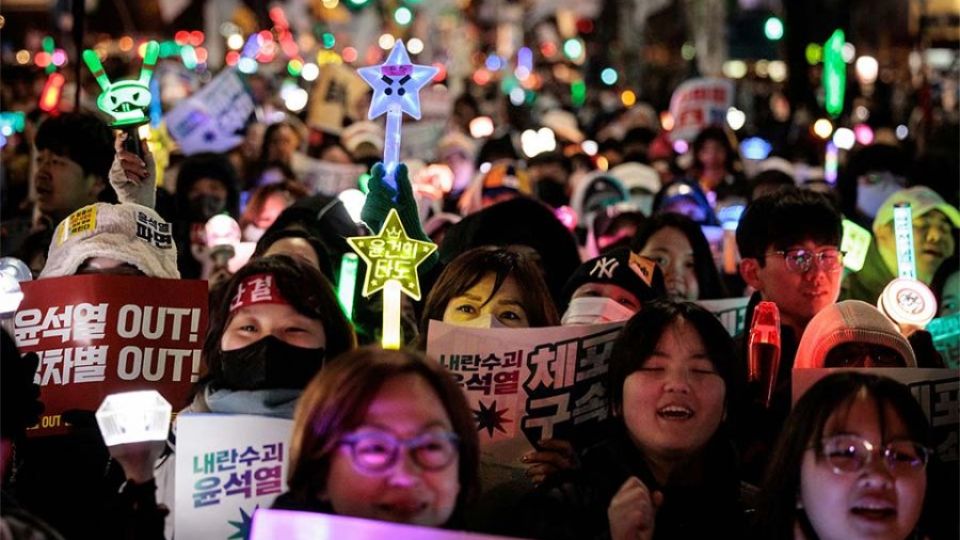January 27, 2025
SEOUL – Recent polls in South Korea have puzzled political pundits. In the days after President Yoon Suk Yeol declared martial law, Yoon’s popularity hit record lows as support for impeachment surged. The opposition Democratic Party of Korea’s support rose and its leader, Lee Jae-myung, was heads and shoulders above all possible opponents in an election to replace Yoon. Then, in late December, the trends started to reverse. What happened? And what does it mean?
A poll conducted in mid-January by Gallup Korea showed the ruling People Power Party taking the lead, for the first time since August 2024, with 39 percent support versus 36 percent for the Democratic Party. In the next presidential election, however, 48 percent want a Democratic Party candidate to win, while 40 percent want a People Power Party candidate to win, but the gap has narrowed considerably. Support for Yoon’s impeachment, once at nearly 75 percent, has fallen to 57 percent with 3 percent opposing.
The point of reversal corresponds with the impeachment of Prime Minister Han Duck-soo. Han had refused to appoint three additional justices to the Constitutional Court that is charged with judging Yoon’s impeachment case. Deputy Prime Minister Choi Sang-mok became acting prime minister and therefore acting president. He agreed to appoint two more justices to the court, which has cooled threats of his impeachment for now.
Han’s impeachment and threats of continued impeachments raised fears of a possible government collapse, which nudged the public to search for stability. In the two previous presidential impeachments, Roh Moo-hyun in 2004 and Park Geun-hye in 2016, the prime minister became acting president and continued until the issue was resolved.
Roh’s impeachment was not upheld, and he quickly resumed presidential powers; Park’s impeachment was upheld, and she was removed from office, which meant the prime minister continued in that role until a new president was elected. The public is familiar with this process, but not one that includes multiple impeachments of potential acting presidents. In this context, declining public support for the Democratic Party can be read as a warning against “impeachment overreach.”
More recently, Yoon used the tussle over his arrest to rally his hardcore supporters. They have become increasingly aggressive, including the use of violence, as evident in a riot at the Seoul Western District Court on Jan. 19.
The visibility of angry Yoon supporters has exacerbated the sense of insecurity in the nation and highlighted political polarization. This has not helped Yoon expand his support, but it has helped to dampen some of the enthusiasm for impeachment.
At a deeper level, generational attitudes are at play. Though support for impeaching Yoon remains strong, much of the zeal for that support comes from the “386 generation” that has dominated South Korean politics since the 1980s. Now moving into their 60s, the generation gets its name from people born in the 1960s who went to university in the 1980s. Though the democracy movement was broad, most of its energy came from students who took to the streets, often at great personal risk, to demonstrate for democratic reforms. As they grew older, they continued their engagement, and that has been the main driver of center-left political movements.
Polls show that Yoon gets his strongest support from those 70 and older. The common experience uniting this group of people is coming of age during an economic boom under the dictatorship of President Park Chung-hee. They are virulently anti-North Korean and have remained suspicious of engagement with North Korea. They respect strong leaders and have supported conservative politics their entire adult lives.
For all their differences, these two generations are similar in viewing politics as a contest between good and evil. This view leaves little room for differing opinions and the possibility of compromise. In this game, the other side must be defeated because it is bad and represents an existential danger to the nation.
Sharp political polarization may animate the 386 generation and above, but younger generations are growing tired of it all. People who came of age after South Korea had already become an advanced democracy are now at least in their mid-40s. They understand the complexities of contemporary life and want a government that works for the common good, rather than trying to impose a partisan will.
Younger generations’ growing rejection for political polarization in older generations is what is moving the polls. They want Yoon out, but are wary of Lee Jae-myung. They are looking for a competent, pragmatic leader who practices democratic values, but have yet to find one. When they do, expect that person to jump in the polls.
Robert J. Fouser, a former associate professor of Korean language education at Seoul National University, writes on Korea from Providence, Rhode Island. He can be reached at robertjfouser@gmail.com. The views expressed here are the writer’s own. — Ed.


